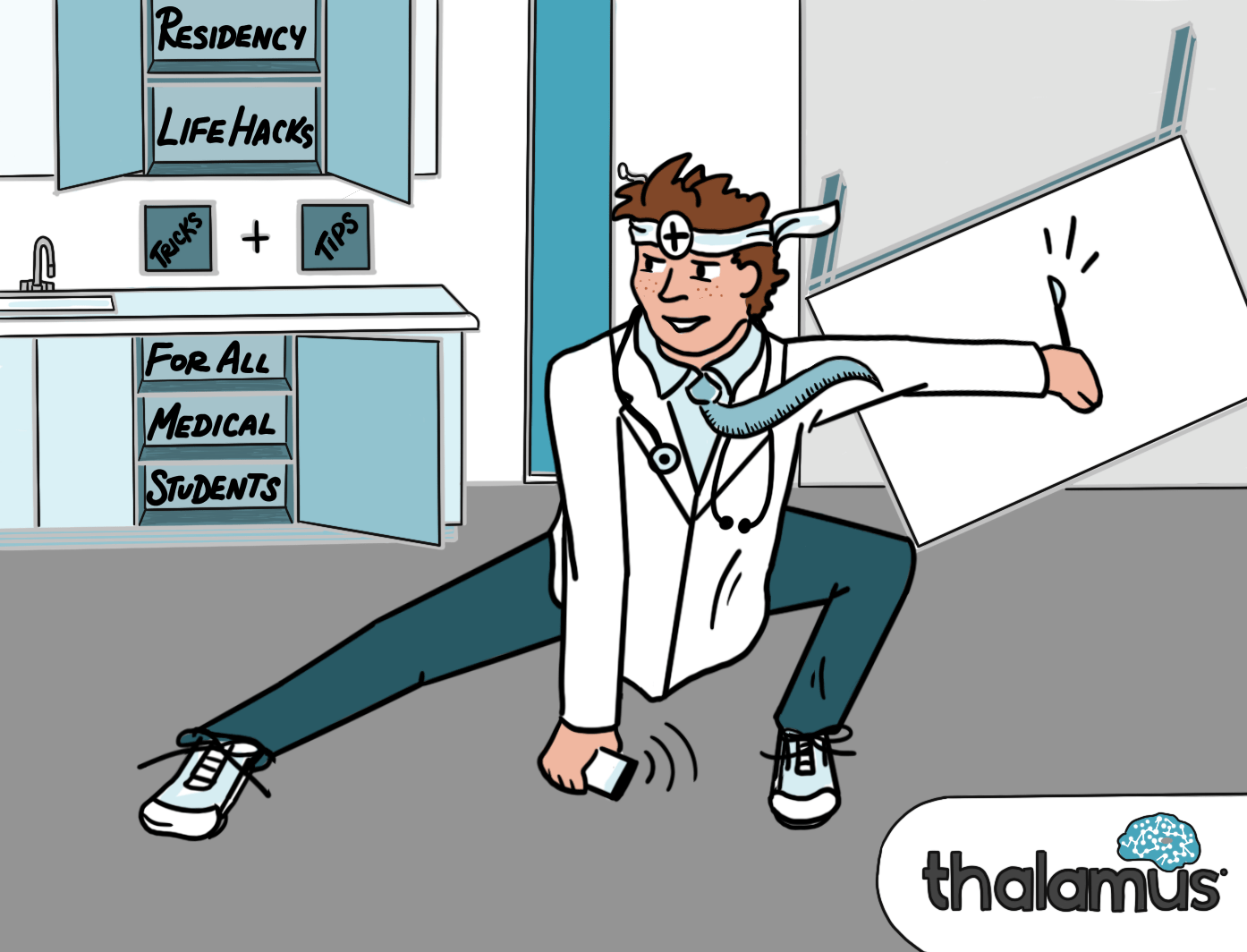We all know residency life hacks make our life more efficient. But what will that efficiency bring? Ah, now that is the key question.
For those in a residency program, efficiency means the following.
Efficiency means you can leave the hospital to go see your significant other, while your co-intern frantically updates the signout notes. Efficiency means you can take time to look up questions on your patients and learn, instead of rushing to put out fires, answer pages, and sign notes. Efficiency means you can give your mind some time to breathe so you can be yourself, instead of feeling flustered, rushed, and irritated. Efficiency means you can take better care of patients, instead of fumbling through a list of differential diagnoses.
Efficiency allows us to be good interns. Which in turn, allows us to be great residents.
Efficiency is a rock-solid foundation we build upon every single day. It is barely perceptible. It isn’t sexy either. It is to be done regularly and consistently. It is working smarter – not harder.
As a medical student, I remember counting how many patients for which I provided care. Then I thought, “Oh well, interns only take care of a few more, so how bad could it be?” I didn’t realize that once I became an intern I wouldn’t have the luxury of time. I had to respond to pages, double check orders, write notes, call consults, follow up on labs, hold family meetings, run things by my senior, talk to the nurse, go to lectures, and so on. Once my name was on the chart and the buck stopped with me, I felt the weight of added responsibility.
It felt…different. Everything can be fine, until it’s not. It wasn’t a two-month rotation. It was a 12-month slog. The difference between running a marathon and sprint. I love what I do, but I had to figure out how to do it better. So I’m sharing those tips. Call them residency life hacks, if you want to—they are just ways to make yourself more efficient and effective.

Create quick phrases on your phone
You’ll be texting your senior and other residents quite often. Sometimes you’ll repeat the same phrases. So instead of typing them out every single time, create a quick phrase. This allows you to type a few letters and then an entire magical phrase is created. It saves seconds. Seconds add up. And it makes you look professional.
Here are a few examples:
- Rou= Good morning. What time would you like to round? And where?
- RBU =Hey. Could you call me real quick? I wanted to run something by you.
- HAP =I’m happy to do that.
- (your initials) = Richard from Medicine, cell ***, pager x***. Feel free to text. Thank you.
- XX = PLEASE CALL IMMEDIATELY. I NEED YOUR HELP

Study off podcasts
I always studied in med school the same way. And then intern year started, and it completely changed. I was quite shocked! No longer did I have the attention span to sit down and read—I would just fall asleep or my mind would wander. No longer did I have a good 50-minute chunk of time to devote to reading. So what did I do?
I turned to podcasts. Somehow, my brain didn’t feel like it was studying when I listened to one of these bad boys. It was like listening to a story. I can recite a children’s story effortlessly. But when it comes to repeating a lecture, I get lost a lot more quickly. Why? Because when I listen to a story I relax and take it all in. I can recall that information much more easily.
Podcasts allowed me to study in bite-sized quantities every day. This helped me score 90% nationally on my In-Training Exam. Just a little bit every single day really added up with this form of residency life hack.
My favorite podcasts
Create dot phrases…
My co-residents used to laugh when they saw me do this. But after they watched me signing out early on a consistent basis, they asked me how I did it. So here it is, a very useful residency life hack.
Figure out what phrases you are constantly typing. For me, these were the ones I used most often.
- Denies CP/SOB
- No acute events overnight
- Slept well
- Endorses
- Improving
So I went into Epic, created key dot phrases, and every time I wrote “sw” it would write out “slept well”. Peers in my internal medicine residency told me that there was no way that this is why I was able to get out early most days. So I shared some studies.
- Research shows that IM residents spend far, far more time at a computer than with patients.
- A professional typist can type about 60 words per minute. If you use shorthand, typing speed can average up to 300 words per minute. So you become five times as fast.
..and templates
First, pick out a common diagnosis like CHF, MI, SOB, PE, diarrhea, CP, sepsis.
Next, create a template. Name it something like “yourinitialsCP.”
Include:
-
- important questions to ask when interviewing a patient,
- a list of differential diagnoses, and
- common recommendations.
Add in pre-populated data that matters to you. You can put it in the note, or even at the bottom. If you put it at the bottom, just reference it when you’re typing the note. And then delete it.
For example, for a CHF exacerbation I would include home medications, last echo report and last 3 weights.
Update it throughout the year.
Why? You won’t have to reinvent the wheel every time. Going to see a patient with SOB? You’ll be able to hammer out that admission very quickly. You’ll look professional and organized when someone reads your note. You’ll present better because you’ll be running through your template in your mind. Just F3 through the whole thing and you’ll be amazed how quickly you can get through it.

Use Evernote wisely
I used to use Evernote like this: look up a diagnosis, copy and paste a bunch of paragraphs from Up To Date and throw in some results from studies. Then I realized that wasn’t smart.
The whole point of Evernote was to be practical. That meant that ideally, I would pull it up before I was going to see a new patient or follow up on a patient. It would be written by me—so no ‘copy and paste’ routines. And it would center upon what was needed. I wouldn’t include things I already knew. So I wouldn’t put down ‘chest pain’ for an MI. Here’s how I improved it.
Creating an entry for a high-yield topic, I focused on the following things: how to recognize it, questions to ask, lab tests to order, ddx including don’t miss diagnoses, and treatment. It was written in sentences, by me. Then I found some Google images that were high-yield—like the hyponatremia work-up!
This entry was practical. I would bring it up during pre-rounding or during rounds on the computer and add pearls or insights to it. Slowly but surely, the file expanded. I added a tiny bit of knowledge every single day.
And that takes care of the high-yield tips. I was extremely skeptical at first but have come to appreciate just how much they are able to do for me. If we’re going to start intern year, might as well do it on the right foot with this residency life hack!
Other reading
If I’ve learned one thing in my medical career, it’s that I don’t have all the answers. With that nugget of wisdom in mind, here are a few other blog posts which you might find helpful for residency:
- On what it means to have a ‘successful’ intern year.
- “The reality is that most residents are average, and average doctors are great!”
Now you can enter your residency prepared to be efficient—and in a career that demands as much time as medicine does, efficiency is a huge asset.
Thalamus was created to bring efficiency and ease to the mayhem that comes before residency: interview season. I hope this post helps a little with the craziness of starting your journey as a medical practitioner!
